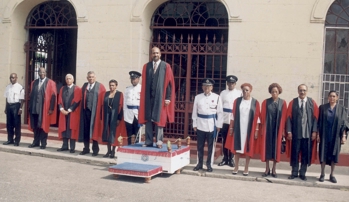
The opening of the October 1999 Assizes. (SN file photo)
| Related Links: | Articles on heritage |
| Letters Menu | Archival Menu |
The coincidence of Eid-ul-Adha/Republic Day and Phagwah/Good Friday has been well received by those Guyanese who have been lamenting over the loss of productive man-hours resulting from many national holidays - official and spontaneously declared.
The lament will surface again early in this new week. On Tuesday morning most of us who are gainfully employed in Central Georgetown will arrive at work very late and very angry and frustrated.
From early in the morning all the streets within a one-mile radius of the High Court will be closed to vehicular traffic to facilitate the ceremonial opening of the April Criminal Assizes.
Motorists will be diverted by traffic policemen and forced to drive around in circles along congested by-ways until the curtains are drawn on that spectacular masquerade in which the finest of the Guyana Police Force preen themselves before the judges.
Lewis Caroll's Alice was able to identify the judge "because of his great wig." The curious onlookers in Croal Street will be able to identify our judges because of their scarlet robes.
These dispensers of justice clad in their red costumes will be acknowledged by policemen turning out in proper ceremonial dress on foot and on horseback, strutting to the accompaniment of a full brass band.
The show is not over until one of the judges who is perched on a lofty platform accepts the invitation to descend onto lower ground, perambulate along the row of policemen who had "presented arms( and nods to signify his approval for another splendid parade.
